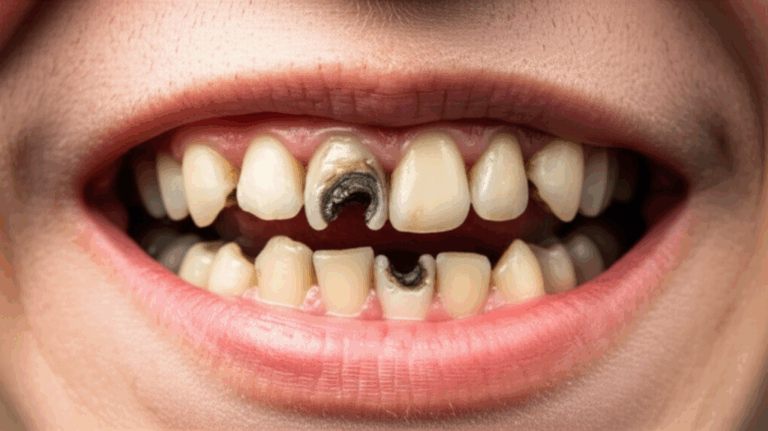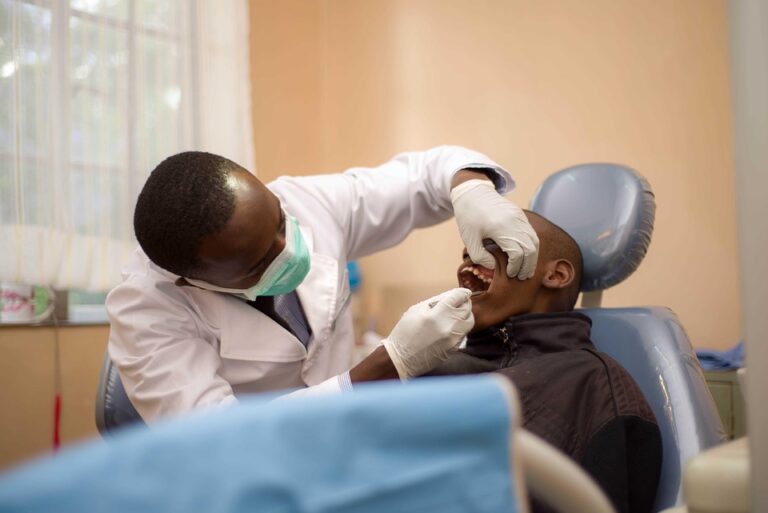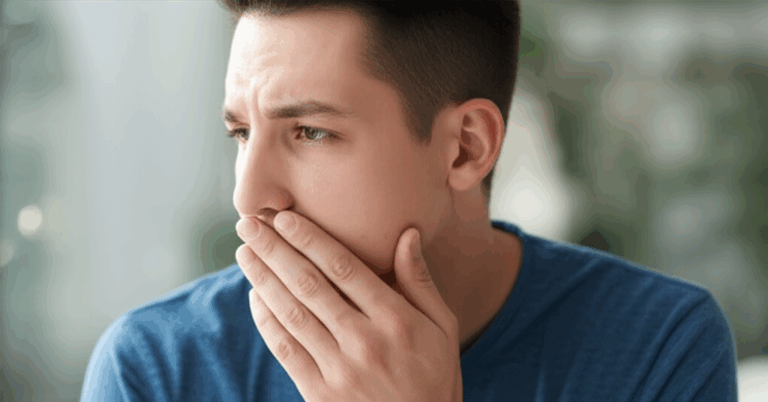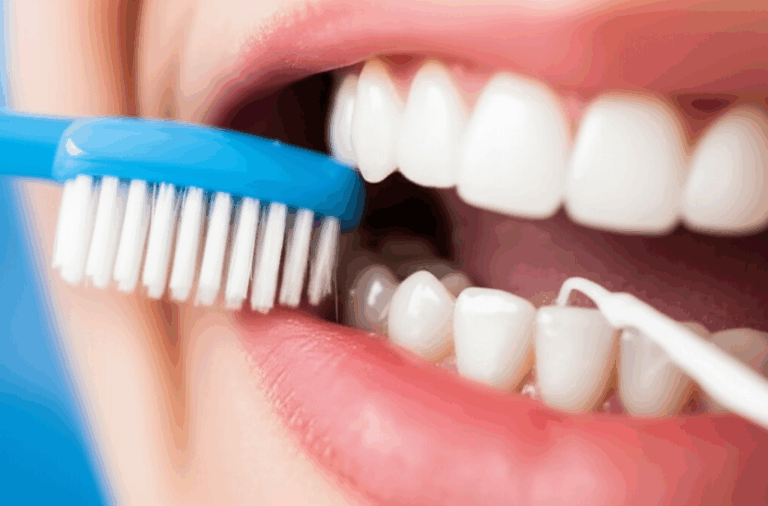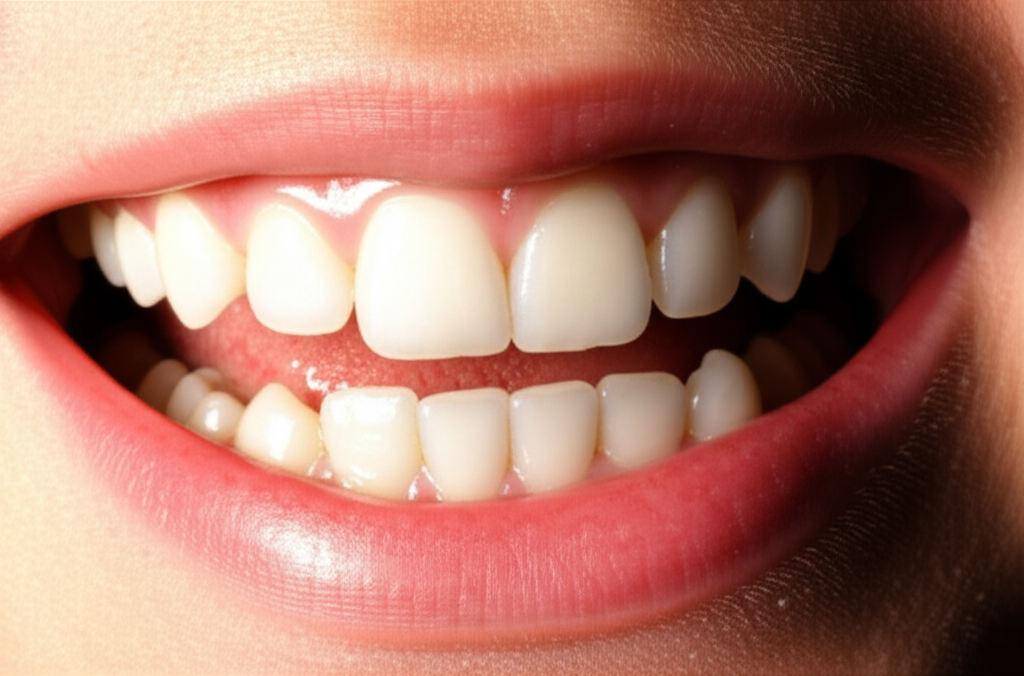
Can COVID-19 Affect Your Oral Health? Understanding the Link Between the Virus and Dental Problems
That weird, nagging soreness in your mouth. Gums that look like they’re shrinking. Even a tooth that suddenly feels loose after being fine for months. If you’ve wondered, “Wait—could COVID be causing my dental problems?” you’re in the right place. The link between COVID-19 and dental issues isn’t in your head—it’s real.
These worries aren’t uncommon. Lots of people around the world are asking the same questions. It’s totally normal to wonder, especially if you’ve noticed new mouth symptoms after having COVID. Maybe your taste still isn’t right. Maybe you wake up with a dry, sticky mouth. Whatever you’re feeling, you want answers—and probably some peace of mind.
Table of Contents
- What’s the Real Connection? (COVID-19 and Oral Health: A Quick Overview)
- Direct Effects: How COVID-19 Can Cause Dental Problems
- Indirect Pathways: COVID-19’s Ripple Effects on Your Smile
- Specific Dental Problems Linked to COVID-19
- Why Does This Happen? The Science Made Simple
- How to Protect Your Oral Health (During and After COVID-19)
- When Should You See a Dentist?
- The Good Candidate: Who’s Most at Risk?
- Your Healthy Takeaway (Summary & Next Steps)
- Frequently Asked Questions
What’s the Real Connection? (COVID-19 and Oral Health: A Quick Overview)
First, let’s answer the big question: Can COVID-19 really cause dental problems? The quick answer: Yes, in a few different ways. While COVID mostly affects the lungs, doctors and dentists have seen it can mess with just about every part of your body—including your mouth.
Dentists everywhere have noticed more people coming in with mouth problems since the pandemic started. Studies and patient reports show there’s a real link between COVID-19 and things like dry mouth, gum problems, jaw pain, and even tooth loss (but that’s very rare).
If you’re dealing with these symptoms, you aren’t alone, and you’re definitely not imagining it. Let’s break it down and talk about what you can do.
Direct Effects: How COVID-19 Can Cause Dental Problems
COVID-19 can hurt your teeth and gums in a few ways. Let’s look at how the virus itself—SARS-CoV-2—can affect your mouth.
1. “COVID Tongue” and Mouth Sores
Have you noticed a swollen or red tongue? Weird bumps? Ulcers or sore spots?
- COVID tongue: Some people get a swollen, odd-colored, or bumpy tongue (“COVID tongue”). Others end up with mouth sores, blisters, or rash-like patches inside their mouth.
- Ulcers and sores: These painful spots can show up (kind of like canker sores), and are sometimes called “herpes-like” or “COVID ulcers.”
Why does this happen? The virus may attack cells in your mouth directly, or your immune system’s reaction might cause swelling or ulcers. Studies say as many as 15% of people with COVID develop some sort of mouth sore or change.
2. Dry Mouth (Xerostomia)
Ever wake up feeling like your mouth is filled with cotton? Studies show between 20% and 40% of people with COVID deal with dry mouth, sometimes for weeks or longer.
- COVID can hurt the glands that make spit, so you get less saliva.
- Some medicines used for COVID also cause dry mouth.
- Saliva does more than just keep your mouth comfortable—it washes away germs and helps protect against cavities and gum disease. When you don’t have enough, problems pile up.
3. Oral Thrush (Yeast Infection)
A white, creamy layer on your tongue, cheeks, or gums? Burning or stinging? This can be thrush—a yeast infection that pops up when your immune system is weak or from some drugs (especially steroids).
Having COVID—or taking some COVID medicines—can raise your chances of getting oral thrush.
4. Gum Swelling and Gum Disease
If your gums have been looking red, swollen, or bleed easier since you got better, you’re not alone.
- Gum swelling and even new or worse gum disease (gingivitis or periodontitis) have been seen after COVID.
- One study says COVID-19 patients are 3 times more likely to get severe gum disease than people who haven’t had the virus.
Indirect Pathways: COVID-19’s Ripple Effects on Your Smile
Not all dental problems are caused directly by COVID. Sometimes, it’s changes in your life during or after being sick that set you up for trouble.
A. Stress and Worry: What’s in Your Mind Shows Up in Your Mouth
- Teeth grinding (Bruxism): More people started grinding and clenching their teeth during the pandemic. Dentists have seen a 50% jump in teeth grinding since COVID hit!
- Jaw pain (TMJ problems): Stress and tense muscles can lead to sore jaws, popping or clicking, and not being able to open wide.
B. Eating and Cleaning Habits Change
When you’re sick or not feeling good, habits slip.
- Sugary/acidic snacks: Comfort foods and drinks (like soda, juice, and sweets) are easier to grab when you’re not feeling good or you’re anxious.
- Skipping brushing/flossing: Feeling wiped out makes it easy to skip taking care of your teeth, but that’s risky.
C. Medication Side Effects
A lot of COVID meds (like antihistamines or some antivirals) dry out your mouth, so it’s easier for bad bacteria or infections to show up.
D. “Mask Mouth”
You might’ve heard wearing a mask dries out your mouth or gives you more cavities. The mask itself isn’t the problem, but wearing one for a long time can make you drink less water or breathe through your mouth, which dries things out. If you also skip good tooth care, it can cause trouble.
Specific Dental Problems Linked to COVID-19
Here are the main mouth and tooth changes people notice after COVID-19:
1. More Tooth Sensitivity
Random zings of pain when you eat or drink something hot or cold? Even with no obvious cavities, people often report more sensitivity after COVID. Blame it on swelling, clenching your teeth, or changes in your mouth.
2. Gums Bleeding or Swelling
If your gums bleed more or look puffier, that’s a sign of swelling (inflammation) as your body tries to heal.
3. Unexpected Tooth Loss
Very rarely, some people with long COVID have lost teeth or had teeth become loose with almost no warning. Doctors think this is from damage to the blood vessels or a breakdown of the gums and bone. Still, this is not common—but get it checked if your teeth feel loose.
4. Cracked or Chipped Teeth
Clenching and grinding (often from stress or sleep problems) can break teeth. Dentists have seen more people with cracked teeth since the pandemic started.
5. Changes in Taste (Dysgeusia) and Smell (Anosmia)
Losing your sense of taste or smell is strange—and it can change what or how you eat, which can affect your teeth. Nearly half of people with COVID report this, and sometimes it sticks around for months.
6. Jaw Pain or Clicking
Some people get jaw pain, clicking, or trouble opening their mouth wide because of TMJ (jaw joint) problems.
7. Bad Breath (Halitosis)
Dry mouth, eating different foods, skipping brushing, and a buildup of germs can all cause bad breath.
Why Does This Happen? The Science Made Simple
Let’s make it easy:
A. The Virus Gets In Your Mouth
Think of your mouth as a house with lots of front doors. COVID-19 uses protein “door handles” called ACE2 receptors—found all over your mouth, tongue, and in your spit glands—to get inside.
- When the virus grabs these “handles,” it can harm the soft tissues and cut back your spit, leading to dryness and more infections.
- Scientists have found real COVID virus in the spit of infected people.
B. Inflammation: Your Body’s Fire Alarm
A healthy immune system signals when there’s danger. Sometimes, COVID-19 sets off a huge alarm (a “cytokine storm”). This causes lots of swelling—not just where it’s needed, but all over, and can harm your gums and bones too. It’s like firefighters flooding your whole house to put out a little kitchen fire.
C. Blood Flow Problems
COVID-19 can hurt your blood vessels, slowing down the blood that keeps your gums and teeth strong. Less blood means less food and oxygen for repairs, which, in rare cases, can mean things break down.
D. Lowered Immunity
Fighting COVID and getting better can weaken your body, making it easier for “bad guys” like bacteria and yeast to take over.
E. Stress
Ongoing stress causes big changes in your body. You might grind or clench your teeth, your gums might swell, and you might let good habits slide. This all adds up over time.
How to Protect Your Oral Health (During and After COVID-19)
The good news? You can take steps to care for your mouth, even after COVID-19.
1. Keep Up Good Tooth Care
It’s basic—but it matters.
- Brush twice daily with fluoride toothpaste
- Floss every day to get rid of hidden gunk
- If your dentist suggests, use an antibacterial mouthwash
- Don’t forget to clean your tongue
Slacking on these makes small problems bigger. Need a step-by-step? Here’s our dental care guide.
2. Stay Hydrated
Dry mouth is trouble. Make water your go-to.
- Sip all day
- Chew sugar-free gum or use sugar-free mints to get more spit flowing
- Stay away from caffeine or booze—they dry you out
3. Keep Seeing Your Dentist
- Tell your dentist if you’ve had COVID, especially with new symptoms.
- Don’t skip check-ups—even if you think your teeth are fine. Lots of problems sneak up.
- Many dentists now offer virtual appointments if you can’t get in person.
4. Deal With Specific Problems
- Grinding/Clenching: Ask about a night guard if you wake up with sore teeth or jaws. Quality night guards can protect your teeth.
- Sensitive Teeth: Your dentist might suggest special fluoride or other treatments.
- Bleeding or Swollen Gums: Act fast—a dentist can help before it turns serious.
5. Manage Stress (For Your Body and Mind)
COVID has been rough on everyone. Stress often shows up in your mouth.
- Try deep breathing or short meditation
- Move your body—walks count!
- Get enough sleep—your mouth (and body) heal better if you rest
- Reach out for help if you’re struggling with stress or mental health
6. Eat Tooth-Friendly Foods
- Say “no thanks” to too much sugar or acid (soda, candy, juice)
- Pick snacks that help teeth: nuts, cheese, plain yogurt, crunchy fruits and veggies
Want more on eating right for your teeth? Visit our teeth health page.
When Should You See a Dentist?
Some mild problems will go away with good home care, but don’t wait if you notice:
- Ongoing pain: Hurts more than a week, keeps you from sleeping, or gets worse
- Gum swelling/bleeding that won’t get better
- Loose teeth or teeth moving
- White patches, open sores, or anything strange inside your mouth
- Trouble chewing, swallowing, or opening your jaw
- Bad breath that brushing won’t fix
Getting help early makes fixing the problem much easier. Your dentist can also check other causes and help you figure out what to do next.
The Good Candidate: Who’s Most at Risk?
Anyone can get mouth problems after COVID-19, but you’re at higher risk if you:
- Already have gum disease or don’t take care of your teeth
- Have chronic illnesses (like diabetes or immune issues)
- Had bad COVID-19 or needed to stay in the hospital
- Took steroids or drugs that lower your immunity
- Are extra stressed out (money, work, or family worries)
- Smoke or vape
If this sounds like you, make a dentist visit even if you’re not having symptoms yet.
Frequently Asked Questions About COVID-19 and Oral Health
1. Is dry mouth a sign of COVID-19?
It’s not the most common sign, but dry mouth happens to up to 40% of people at some point with COVID. If it doesn’t go away, tell your doctor or dentist.
2. Will COVID-19 mouth problems last forever?
Most get better if you take care of yourself, but changes in taste or long-lasting gum issues can stick around for weeks or months. Getting help early does improve things.
3. Can COVID-19 really make my teeth fall out?
Tooth loss is very rare, and usually only in people with really bad or long COVID—often if other health problems were already there. If you feel loose teeth, don’t wait—see a dentist.
4. How do I manage dental issues if I’m still sick or isolating?
Keep up gentle but thorough care at home, drink lots of water, and eat soft foods if your mouth hurts. Call your dentist—many offer help by phone or video if you need it quickly.
5. Does wearing a mask give me mouth problems?
Not directly, but if you drink less water or breathe through your mouth with a mask, you may have more dryness or bad breath. Drink water and take breaks when safe.
Your Healthy Takeaway (Summary & Next Steps)
Here’s the quick version:
- COVID-19 can affect your mouth directly (by infection and swelling) or indirectly (by stress, medicine, and changing habits).
- Common problems: Dry mouth, mouth sores, gum problems, tooth pain, lost sense of taste or smell, jaw pain, cracked teeth, and bad breath.
- You’re not making it up—there’s real proof, including a 3x higher risk of gum problems after COVID.
- Protect your teeth:
- Keep up brushing, flossing, hydrating, and eating right
- Keep up with dental visits and tell your dentist if you’ve had COVID
- Control stress and don’t ignore ongoing or new symptoms
Don’t forget: Your dentist isn’t just for fixing teeth—they’re for stopping problems before they start. Brush up on the basics at our teeth information page or see what’s new with china dental labs.
Things are still unpredictable, and your mouth might give you mixed signals—but now you know how to read them. Be proactive, ask questions, and don’t hesitate to ask for help. Your smile matters!
Data and Research: Quick Reference
| Symptom/Issue | Likelihood | Research Highlight |
|---|---|---|
| Dry mouth | 20-40% | Oral Diseases (2021), Italian observational study (2022) |
| Oral lesions | Up to 15% | Journal of Acad. Derm (2020), Clin Oral Inv (2021) |
| Taste change | 40-50% | WHO, CDC, JAMA studies |
| Gum disease risk | 3x higher | J Clin Periodontol (2021) |
| Bruxism increase | +50% pandemic | J Oral & Facial Pain Headache (2021), dentist reports |
| Tooth loss | Rare | J Oral Med Oral Surg (2020), case reports |
| Thrush | Increased | Seen in hospitalized or corticosteroid users |
Want a deeper dive on how COVID affects the mouth and germs in it? Check out digital dental labs for info on how technology is shaping new ways to care for teeth.
Empower Yourself: Next Steps
- Notice something different? Check in with your dentist soon (in person or by phone).
- Keep up your daily tooth care—even if it’s tough.
- Don’t ignore stress—it’s real, and it affects your health.
- Stay in the know by reading reliable dental info.
- Don’t worry: Most dental problems after COVID can be fixed, especially if you catch them fast.
Your health is a team effort—so stay involved, and let your health pros help you when things don’t feel right.
Stay safe, stay smiling. Your future you—and your teeth—will be glad you did.
For more help, like getting night guards or retainers, check with trusted providers like a reliable dental lab for retainers for good options. Take care of your mouth—especially during tough times.
This article is based on top research and reviewed by real dental pros for accuracy and clarity.

